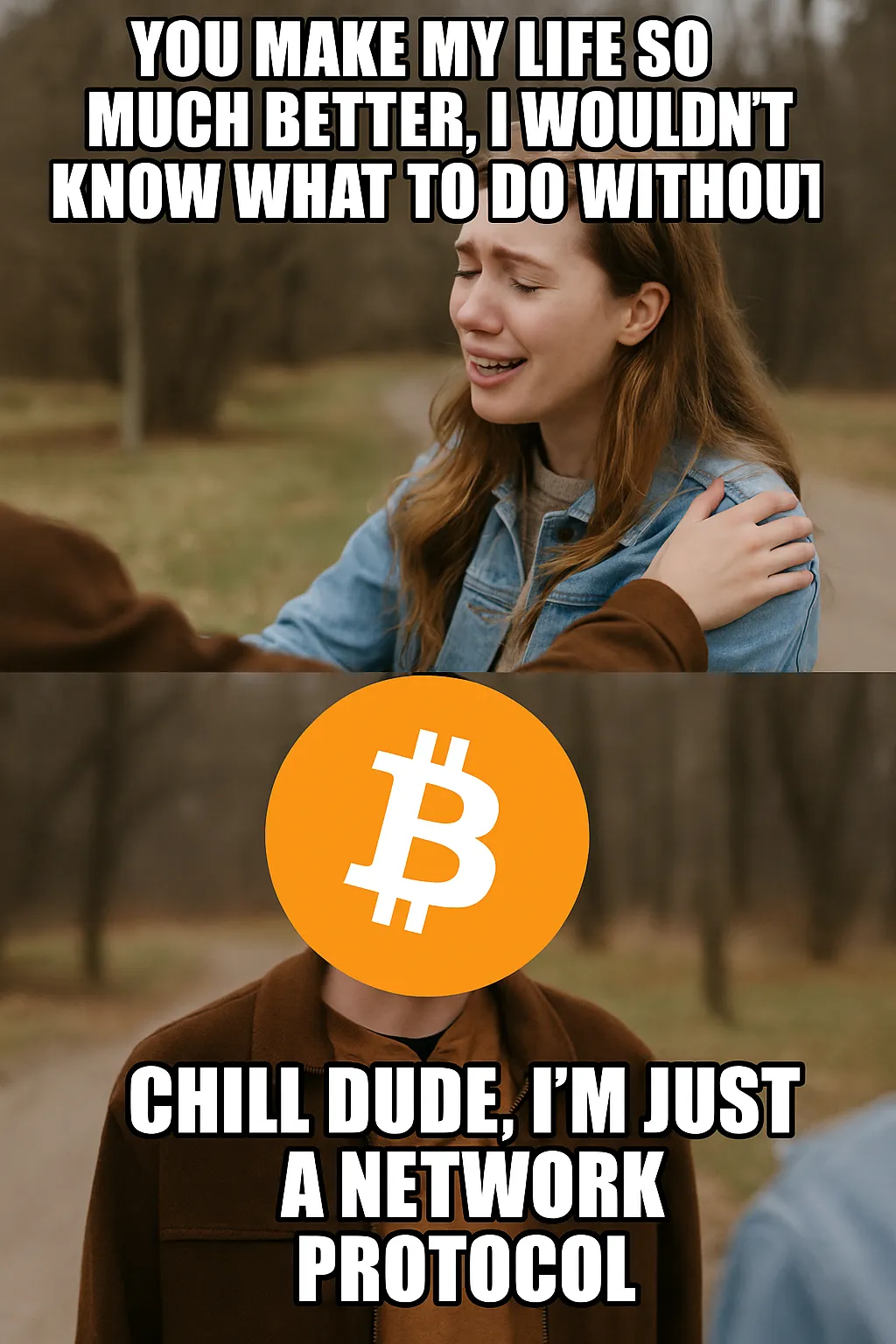
Bitcoin Is a Network, Just Like the Internet
Most people think of Bitcoin as an asset—digital gold, a volatile investment, or a speculative bet.
But that’s only half the story.
Bitcoin is not just something you buy and hold. It’s a network. A protocol. A public utility.
Just like the internet.
Understanding this changes everything—because once you stop seeing Bitcoin as a price chart and start seeing it as infrastructure, you realize why it’s not just valuable, but inevitable.
In this article, we’ll break down:
The difference between Bitcoin the network and bitcoin the asset
How the internet actually works as a decentralized protocol
How Bitcoin mirrors the internet’s design
Why this distinction matters—especially for people deciding whether to own bitcoin
Let’s connect the dots.
1. Bitcoin: Network vs. Asset
Let’s start with the most important distinction.
Bitcoin (with a capital B) refers to the network—a decentralized protocol, a global database, a system of consensus that no one controls and everyone can access.
bitcoin (with a lowercase b) refers to the asset—the digital tokens that exist on the Bitcoin network and represent ownership, value, and economic incentive.
📘 Think of Bitcoin like the internet:
The internet is the protocol (TCP/IP).
An email or a website is the data you send over it.
Similarly:
Bitcoin is the network.
bitcoin (BTC) is the value transmitted.
This distinction is crucial.
Most critics—and unfortunately, many investors—conflate the two. They treat bitcoin the asset like a tech stock, unaware that it's riding on top of the most secure, resilient network ever created for transmitting value.
And it’s the network, not the price, that’s truly revolutionary.
2. The Internet Is a Protocol—Not a Company
To understand Bitcoin, you first need to understand how the internet works.
The internet isn’t a product. It isn’t a company. And it wasn’t built by any single person.
It’s a network protocol—a set of open rules that allows different computers to communicate without needing a central authority.
Key protocols include:
TCP/IP: the backbone that lets devices send data in packets
HTTP: the language of websites
SMTP: the protocol behind email
These protocols are public, open, and neutral. Anyone can use them. No one can shut them down. No single company owns the internet.
🔗 Learn more: "How the Internet Works in 5 Minutes"
This is why the internet succeeded: it wasn’t built as a product. It was built as a foundation others could build on. Web browsers, search engines, social networks—all are apps riding on top of a neutral protocol layer.
Now here’s the punchline:
Bitcoin is doing the same thing—for money.
3. Bitcoin as a Protocol: The Internet of Value
Bitcoin is often called “the internet of money.” But that’s not a metaphor—it’s architecture.
Bitcoin is a network protocol that:
Runs on a decentralized set of nodes around the world
Uses a consensus mechanism (proof-of-work) instead of a central server
Has a built-in monetary policy—rules without rulers
Allows anyone to participate, anywhere, with no gatekeeper
Just as the internet transmits information, Bitcoin transmits value.
It’s not an app, not a company, not a product. It’s a foundation. A monetary protocol. And it’s just as neutral as TCP/IP.
📘 Recommended reading: "Dear Crypto Bros" by Der Gigi
Bitcoin's Layered Architecture (Like the Internet)
Layer 1: Bitcoin base layer – Like TCP/IP, it provides security, decentralization, and immutability.
Layer 2: Lightning Network – Like HTTPS or FTP, it adds speed and scalability for everyday payments.
Applications: Wallets, nodes, exchanges – Just like browsers and email clients, these are user interfaces on top.
Bitcoin is not static either—it evolves through proposals called BIPs (Bitcoin Improvement Proposals), vetted by developers and adopted only through consensus. No dictator. No CEO.
🔗 Learn more: "What is the Lightning Network?"
4. Why This Matters to the Average Person
Let’s get practical.
Why should you care that Bitcoin is a network, not a stock?
Because it reframes how you should think about:
✅ Ownership
When you own bitcoin, you’re not holding a company share or a digital casino chip. You’re holding a slice of a global settlement network—the first one that’s truly open, borderless, and censorship-resistant.
You’re participating in a public monetary protocol, not betting on a startup.
✅ Survivability
Companies can go bankrupt. Apps can get shut down. Startups can be bought, censored, or pivoted.
Protocols? They endure.
TCP/IP has lasted 50+ years.
SMTP is still how your email gets delivered.
Bitcoin has had 100% uptime since 2009.
No CEO. No downtime. No bailouts. No rescues. Just rules that work.
✅ Inclusion
Billions of people are excluded from the traditional financial system. No bank account, no credit history, no permission.
But just like the internet let anyone publish or communicate freely, Bitcoin lets anyone store and send value freely.
No one can block your transaction. No one can devalue your coins. No one can inflate the supply.
You don’t ask to use Bitcoin. You just use it.
🔗 Watch: “The Human Rights Case for Bitcoin” by Alex Gladstein
✅ Long-Term Mindset
If you think Bitcoin is a tech play, you’ll judge it like a startup:
“Why isn’t it innovating faster?”
“What’s the next killer app?”
“Is it losing market share?”
But Bitcoin is infrastructure. Its job is to be predictable, not experimental. You don’t want your money to pivot. You want it to work, forever.
Understanding this helps you hold with conviction—through price swings, FUD, or new coin distractions.
5. Real-World Examples of Bitcoin as a Network
Still skeptical? Here’s how people are using Bitcoin the network—not just the asset.
📲 Lightning Network in El Salvador
People use apps like Strike and Blink to send money instantly using the Bitcoin network—but with zero-fee, instant Lightning payments.
🔗 See it in action: Bitcoin Beach Project
💸 Refugees & Human Rights Activists
Whether in Nigeria, Ukraine, or Afghanistan, individuals are preserving wealth and coordinating aid using Bitcoin wallets—no banks required.
🌍 Global Remittances
Families are bypassing Western Union’s fees and delays by sending bitcoin to family in real time—without asking permission.
6. Common Misconceptions, Corrected by the Network View
Let’s address some false ideas that disappear once you see Bitcoin as a network:
❌ “Bitcoin is too slow!” → You're thinking like an app. Bitcoin is a settlement layer, like SWIFT—but for the internet.
❌ “Bitcoin wastes energy!” → The network secures global value without central trust. That costs energy—just like the internet does.
❌ “Other coins are faster/cheaper!” → Bitcoin prioritizes decentralization and security. Other coins are apps. Bitcoin is infrastructure.
Conclusion: Think Infrastructure, Not Investment
If you only see bitcoin as an asset, you’re playing checkers while everyone else is building fiber-optic cables.
Bitcoin is not about short-term returns. It’s not trying to beat the S&P 500. It’s rebuilding the concept of money from the protocol layer up.
That makes it hard to grasp—but world-changing once you do.
The internet taught us that protocols win. Not because they’re fast. But because they’re open, stable, and permissionless.
Bitcoin is doing the same—for money.
Final Thought
When you hold bitcoin, you’re not just investing.
You’re plugging into a global, unstoppable monetary protocol. One that treats every person equally. One that will outlast us all.
And the best part?
It’s still early.



